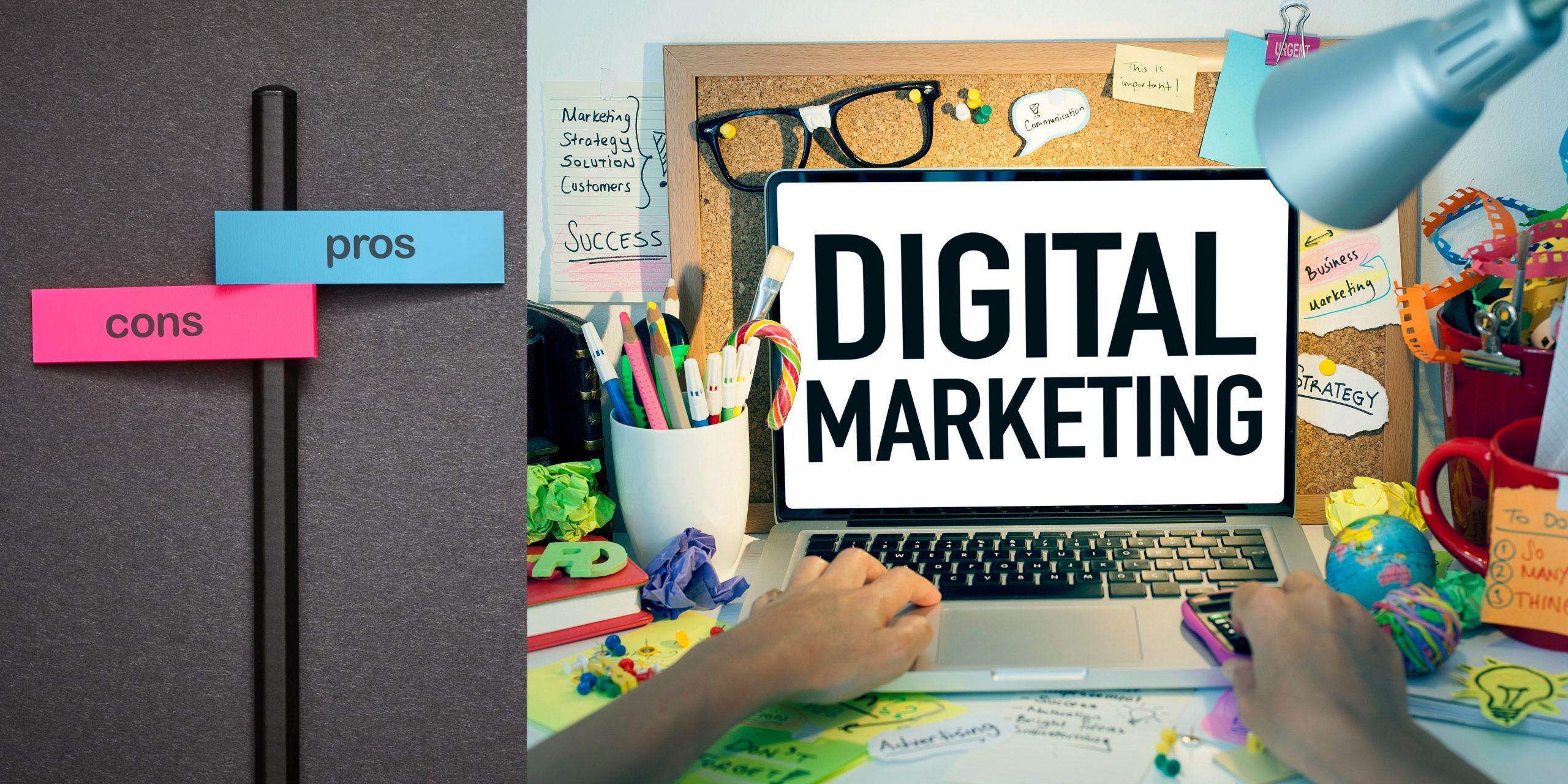Digital Marketing is the process of bringing together the internet, social media and traditional marketing channels to promote a product or service. This can be done through email, blogs, websites, social networks, search engine optimization (SEO), video marketing and paid advertising on digital media sites like Facebook and Twitter. The idea is that by using many different types of digital platforms with a unified message about your company’s products or services, it will help make an impact on potential clients.
In this post, we will look at digital marketing from the perspective of both a seasoned pro and an inexperienced beginner seeking guidance. Both viewpoints have pros and cons, so keep reading to learn more.
The Pros of Digital Marketing
1. Reach a large audience with your message.
With digital marketing, you can reach a very large audience. You could literally have your message heard by everyone who shops online or uses digital media. It can help improve your company’s visibility online and increase brand awareness among potential customers.
2. Different messages for different audiences.
The digital medium allows digital marketers to target messages differently depending on the person receiving the message. You can create specific campaigns for different segments of your audience. On top of that, digital channels give digital marketers instant feedback so they know if their message is being received positively or not which makes it easier to improve it and take action accordingly.
3. Easier to measure than traditional marketing efforts.
It can help you achieve a higher return on investment (ROI) than traditional marketing methods and can also make digital marketers’ jobs easier because they understand how their digital marketing efforts are performing. They know the ROI of digital channels like Google AdWords by tracking how many visitors were referred to their website from digital media.
4. Access to information.
Digital marketers also have access to more valuable data about consumers than ever before which allows them to create targeted messages that will be most effective with different audiences. For example, digital marketers can track mobile phone usage and behavioural patterns through GPS systems to gain insights into where people shop, what time they go out for dinner or even where they travel during certain periods of the year so digital marketers can develop these insights into digital strategy across all platforms.
5. Personalization of messages.
There is no greater tool in digital marketing than digital marketers being able to use digital technology to personalize a digital marketing message. They can take someone’s name, location and interests from digital channels and put them directly into digital marketing messages so they have a better chance of converting the recipient.
6. Can be cost-effective.
Digital marketing is also cost-effective compared to traditional marketing channels as digital marketing channels allow for economies of scale that do not exist in traditional channels. For example, digital media allows digital marketers to reach an audience across multiple regions through one digital campaign which reduces costs associated with print advertising or television campaigns.
7. Flexibility.
It is also a very flexible medium that digital marketers can use to their advantage. It allows you to tailor your campaigns to meet the specific needs of your business. They can change campaigns on the fly, test new ideas and measure the results quickly and easily.
8. Increased customer engagement.
It allows customers to get involved directly with the conversation around your brand, products or services through digital platforms which leads to a better customer experience. This can create lasting interactions with customers in building strong and dynamic relationships.
9. Trackable results.
One of the biggest benefits digital marketing has over traditional marketing is that digital channels allow digital marketers to see results. They can track by offering you detailed data about how many people visited their website, visit digital analytics tools or download a piece of digital content. This allows digital marketers to measure the success of each campaign and what actions were taken as a result so they can continue to improve and optimize future efforts.
The Cons of Digital Marketing
1. The digital world is constantly changing.
The digital world is constantly evolving which makes it difficult for digital marketers to keep up. It requires them to be always learning and keeping up with the latest changes in technology, search engine algorithms, social media sites and more.
2. Increased competition for attention.
With so many messages being sent to people through digital channels, it’s increasingly difficult to get your message heard above the noise. This means you need to have a great message that stands out and is relevant to digital channels where your customer is spending their time.
3. Lack of face-to-face interaction with customers.
In digital marketing, there is less opportunity for digital marketers to build a relationship with the digital customer because they are working in digital channels that involve just two parties (you and your customer) whereas traditional marketing involves all kinds of interactions between you, the digital marketer and the consumer.
4. Customers can easily ignore or block digital messages.
Digital customers can avoid getting digital advertisements altogether by using an ad blocker on their computer or mobile device which makes it much more difficult for digital marketers to connect with potential customers compared to traditional media like TV ads or print ads which cannot be blocked so easily. They also have the ability to unsubscribe from digital marketing lists with just a few clicks which makes it difficult for marketers to keep track of who is interested in their product or service.
5. Increased spending on digital campaigns does not always guarantee success.
Just because you are spending more money on digital marketing campaigns does not mean that you will necessarily get better results. In fact, some digital marketers have found that they have to spend even more money on digital campaigns in order to achieve the same results as they did when they were using traditional marketing channels.
6. Difficulty measuring the effectiveness of digital campaigns.
Digital marketers find it difficult to measure the effectiveness of digital campaigns because there are so many different ways to measure it – from website visits to digital sales, social media presence and digital downloads – which makes it difficult for digital marketers to properly track the impact of digital campaigns.
7. Susceptible to criticism and negative publicity.
It is also susceptible to criticism and negative publicity because it is a public medium. When people complain about a product or service online, it leads other people to believe that the product or service is bad. If your company has negative reviews online, it can lead to a loss of potential customers. For example, if you run a digital ad campaign that is deemed offensive, you might receive backlash from the public who disagrees with your message.
The Pros of Digital Marketing outweigh the Cons by far. Almost all companies use some type of digital marketing nowadays, especially with how affordable it is. However, there are still some older businesses sticking to more traditional forms of advertising, which can limit their reach and profits. Overall, digital marketing is a great way for companies to promote their products and services efficiently and effectively. Make sure that you consider all angles and pick methods that will help achieve your goals in a cost-effective and timely manner. If you want professional guidance navigating these choices, don’t hesitate to contact us today!




